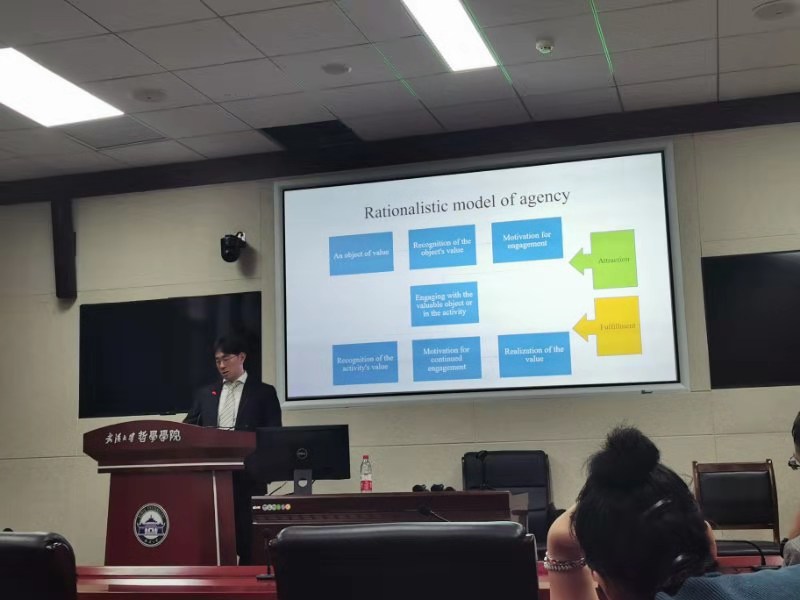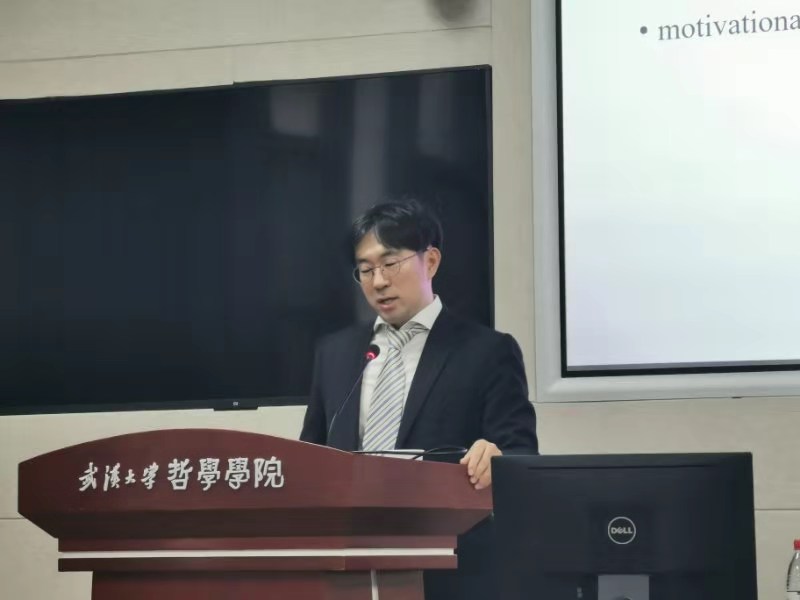On Wednesday 15:30, November 6, 2019, Professor Hyunseop Kim of Seoul National University had a lecture in B214 of Zhenhua Building. The theme of his lecture is “The Emotion of Fulfillment and its Phenomenology”.
At the beginning of the lecture, Professor Kim introduced Susan Wolf’s account of meaning in life, and then argued that meaningfulness consists in correct fulfillment. According to Wolf’ view, one’s life is meaningful insofar as one finds oneself loving things worthy of love and able to do something positive about it. In terms of evaluation of an emotion and its correctness, Professor Kim interpreted that Wolf’s view is that meaningfulness consists in correct fulfillment. Regarding evaluation of emotions, fulfillment is a positive evaluation of an activity as rewarding. Regarding correctness of emotions, fulfillment of an activity is correct iff the activity is in fact rewarding. And the interpretation of meaningfulness as correct fulfillment explains the correspondence between the fulfillment’s evaluative content and the activity’s objective value.

To clarify and distinguish Wolf’s concept of “fulfillment” and “attraction”, Professor Kim then introduced Wolf’s rationalistic model of agency. Attraction and Fulfillment are evaluative-cum-motivational. To explicate the difference, Kim made an example that a pianist plays music to his satisfaction. The attraction refers to experience that pianist undergoes when recognition of the music’s value leads to motivation for engagement. Fulfillment refers to the experience that the pianist undergoes when recognition of the value of his performance leads to motivation for continued engagement with the playing music.
After distinguishing “fulfillment” from “attraction”, Kim focused on characteristics of fulfillment. He argued that fulfillment is an emotion. Fulfillment is non-conceptually evaluative, motivational, not under the voluntary control of the person who experiences it, and manifest in bodily expressions. These characteristics show that fulfillment is emotion.
To further understand the emotion of fulfillment, Kim discussed whether it has have a distinct phenomenal quality. He argued that it has a distinctive evaluative phenomenology that is, however, irreducible to the sensory, cognitive or agentive phenomenology. Experience of fulfilment is irreducible to sensory phenomenology, because experiences of fulfillment vary in different activities and they seem not to share common sensory phenomenology. It is irreducible to cognitive phenomenology, because fulfillment helps us focus on the activity and act smoothly and efficiently. It is irreducible to agentive phenomenology, because fulfillment arises out of one’s active engagement and it is not a thing one can positively feel towards it. However, experience of fulfillment does have a distinctive evaluative phenomenology. Because by experience of fulfillment, particular activity presents its evaluative property to the emoter and leads the emoter to attribute the evaluative property to the activity.
Since that fulfillment’s evaluative phenomenology is only one part of emotion, Kim then furthered the question on the value of its evaluative phenomenology. He argued that the value of fulfillment’s phenomenology lies not in hedonicity, but in its epistemic and motivational role. The pleasure of accomplishment could be intensely hedonic after completing the activity; but Fulfillment is what motivates the activity brings about the accomplishment. Fulfillment has epistemic value by serving as a tool to discover our talents and abilities. It has motivational value by playing a role in motivating engagement with what we regard as worthwhile.

At the end of the lecture, Professor Kim had a discussion with audience on issues related to the lecture, such as question on the essential part of emotion, mismatching question between experience of fulfillment and objective value. After an-hour discussion, the lecture ended with applause.
(Photo&Written by Pang Chunhua)



